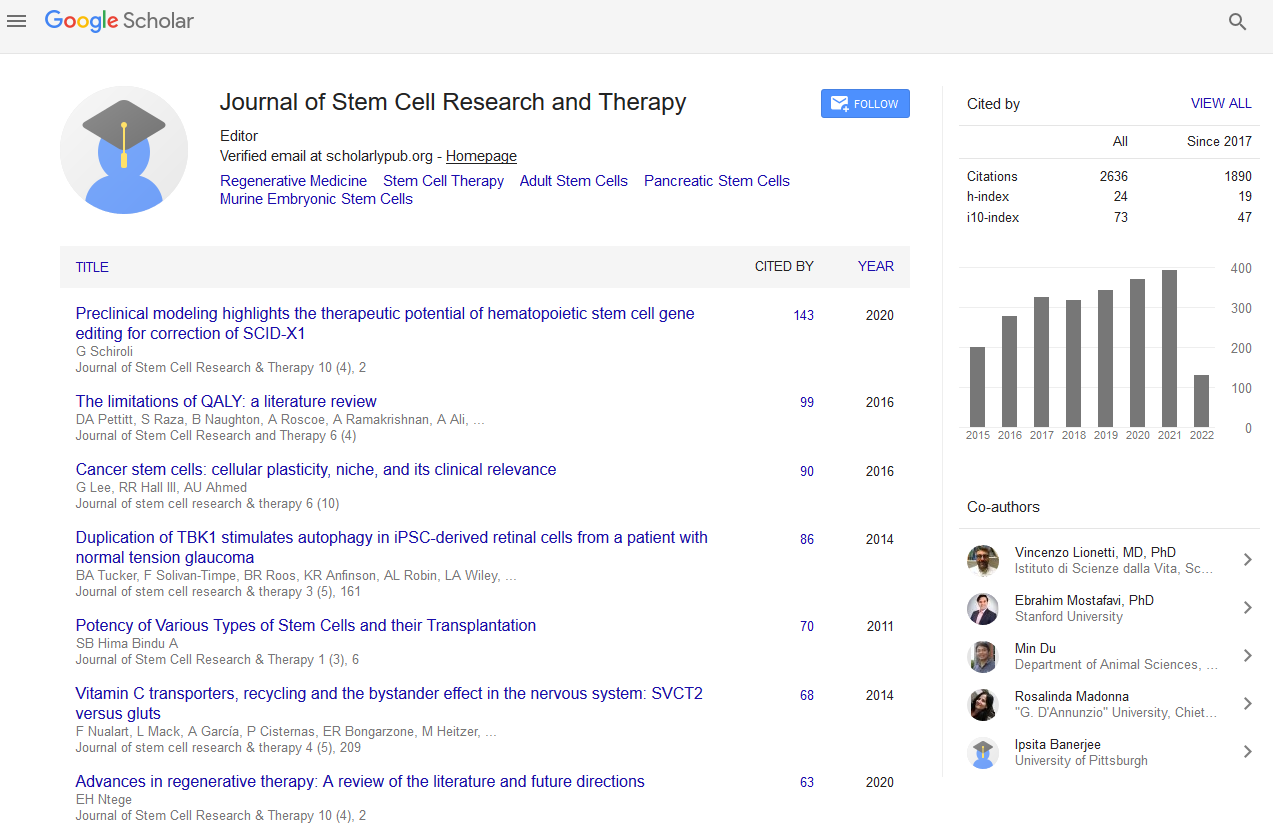Indexed In
- Open J Gate
- Genamics JournalSeek
- Academic Keys
- JournalTOCs
- China National Knowledge Infrastructure (CNKI)
- Ulrich's Periodicals Directory
- RefSeek
- Hamdard University
- EBSCO A-Z
- Directory of Abstract Indexing for Journals
- OCLC- WorldCat
- Publons
- Geneva Foundation for Medical Education and Research
- Euro Pub
- Google Scholar
Useful Links
Share This Page
Journal Flyer

Open Access Journals
- Agri and Aquaculture
- Biochemistry
- Bioinformatics & Systems Biology
- Business & Management
- Chemistry
- Clinical Sciences
- Engineering
- Food & Nutrition
- General Science
- Genetics & Molecular Biology
- Immunology & Microbiology
- Medical Sciences
- Neuroscience & Psychology
- Nursing & Health Care
- Pharmaceutical Sciences
Post-transcriptional regulation of the tissue inhibitor of metalloproteinase-3 gene
3rd International Conference and Exhibition on Cell & Gene Therapy
October 27-29, 2014 Embassy Suites Las Vegas, USA
Yue Zhang, Ian Clark, Robert K Nuttall, Caroline Pennington, Julia Zhong, Alba Warn and Dylan R Edwards
Scientific Tracks Abstracts: J Stem Cell Res Ther
Abstract:
Tissue inhibitor of metalloproteinases-3 (TIMP-3) is a major regulator of extracellular matrix degradation, cell signaling and apoptosis via control of the activities of the matrix metalloproteinases (MMPs) and adamalysin metalloproteinases (ADAMs). TIMP3 gene plays an important role in cardiac remodeling. Deficiency of TIMP3 expression is frequently found in human cancers and heart failure. Dysregulation of microRNAs and the RNA binding protein HuR have also been linked to disease pathogenesis. However, the functions of miRNAs, AU-rich elements and HuR in regulating TIMP3 expression remain largely unknown. Results here provide evidence that TIMP3 is regulated post-transcriptionally directly via its 3?-UTR. The presence of negative regulatory elements in the mouse Timp3 3?-UTR was indicated. Further analysis revealed a target site of miR-1in the TIMP3 3?-UTR. MiR-1 was shown to effectively decrease TIMP3 mRNA and protein expression. miR-21 inhibited TIMP3 mRNA expression via a highly conserved target site. Endogenous miR-21 is commonly upregulated in cancers. The fact that oncogenic miR-21 regulates the apoptosis-related gene TIMP3 suggests a novel mechanism contributing to TIMP3 silencing and may offer a partial explanation of the anti-apoptotic effect of miR-21. In conclusion, this study investigated the role of cis-elements (AU-rich elements, miRNA target sites and conserved regions) and trans-acting factors (ARE binding protein HuR, miRNAs) in regulating TIMP3 post-transcriptional regulation. Identification of the functions of these factors in the regulation of TIMP3 gene expression may identify new targets for therapeutic intervention in cancer and other diseases.
Biography :
Yue Zhang has completed his PhD at the age of 35 years from University of East Anglia and Postdoctoral studies from Tsinghua University School of Biology. He is the Associate Professor of ShenYang Medical College. He has published more than 12 papers.


